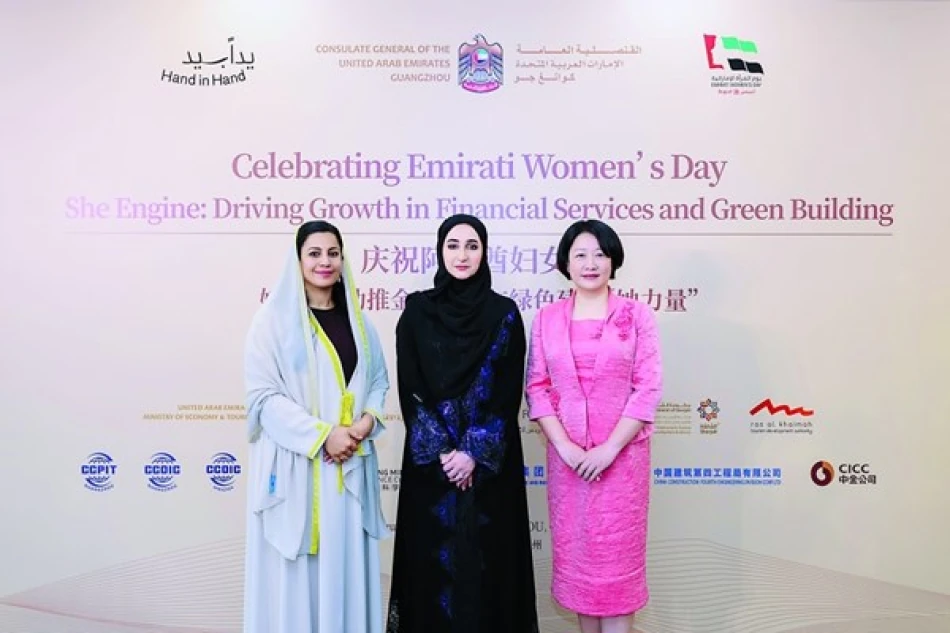
Egyptian Ministers Discuss Women's Economic Empowerment at China Summit
UAE Positions Women as Economic Diplomats in China Partnership Push
The UAE is leveraging its celebrated tradition of women's empowerment to deepen economic ties with China, as senior female officials and entrepreneurs led high-level discussions in Guangzhou focused on sustainable finance, fintech, and foreign investment. The initiative signals how the Emirates is using gender equality as both a diplomatic tool and competitive advantage in securing international partnerships.
Strategic Diplomacy Through Women's Leadership
The UAE's Ministry of Economy and Tourism organized the "Women's Economic Dialogue" in Guangzhou as part of Emirati Women's Day 2025 celebrations, but the event carried deeper strategic significance. By positioning prominent businesswomen and government officials as economic ambassadors, the UAE demonstrated how it has transformed women's empowerment from a domestic policy achievement into an international competitive edge.
Badriya Al Maidoor, Assistant Undersecretary for Support Services at the Ministry of Economy and Tourism, led the delegation alongside Consul General Maryam Al Shamsi and entrepreneur Maryam Al Mansoori, CEO of Rebound company. Their participation reflected the UAE's deliberate strategy of showcasing female leadership in sectors where China seeks greater collaboration.
Beyond Symbolism: Targeting High-Value Sectors
Fintech and Green Building Focus
The dialogue sessions concentrated on sustainable finance, investment, financial technology, and green construction—sectors where both the UAE and China are making substantial commitments. This wasn't coincidental. The UAE has positioned itself as a regional fintech hub while pursuing ambitious climate goals, creating natural synergies with China's own green finance initiatives and Belt and Road sustainability commitments.
Representatives from Sky River and Isaal companies joined the discussions, indicating the UAE's intention to move beyond government-to-government cooperation toward concrete business partnerships in emerging sectors.
Foreign Investment Attraction Strategy
Sessions on attracting foreign companies to establish operations in the UAE revealed the Emirates' broader economic diversification strategy. By highlighting women's roles in this process, the UAE differentiates itself from regional competitors who may offer similar tax advantages and infrastructure but lack the same level of gender inclusion in business leadership.
Competitive Positioning Against Regional Rivals
The UAE's approach contrasts sharply with other Gulf states still developing their women's economic participation frameworks. While Saudi Arabia has made dramatic policy changes under Vision 2030, the UAE leverages its decades-long head start in women's empowerment as a proven track record for international partners.
This mirrors Singapore's successful use of multiculturalism and social stability as business attraction tools, demonstrating how smaller nations can compete with larger economies through distinctive social and governance advantages.
Investment and Market Implications
Signaling Stability to Chinese Investors
For Chinese companies evaluating Middle Eastern expansion, the UAE's consistent women's empowerment policies signal broader institutional stability and modern governance structures. This becomes particularly valuable as Chinese firms face increasing scrutiny in Western markets and seek reliable alternative partnerships.
The presence of established female entrepreneurs like Al Mansoori provides Chinese investors with concrete examples of successful business environments, potentially accelerating investment decisions in sectors from technology to renewable energy.
Alignment with UAE Vision 2031
The initiative directly supports the UAE's "We the Emirates 2031" vision, which positions the country as a global hub for future industries. By demonstrating women's leadership in fintech and sustainable finance, the UAE strengthens its case for hosting regional headquarters of international financial institutions and technology companies.
Long-term Strategic Calculus
This economic dialogue represents more than cultural exchange—it's strategic positioning for the next phase of UAE-China relations. As both countries navigate changing global trade dynamics and seek to reduce dependence on traditional Western partnerships, women's economic leadership becomes a differentiating factor in building trust and sustainable cooperation.
The UAE's ability to seamlessly integrate gender empowerment with economic diplomacy may well become a template for how middle powers leverage social progress as geopolitical and economic advantages in an increasingly multipolar world.
Most Viewed News

 Layla Al Mansoori
Layla Al Mansoori






